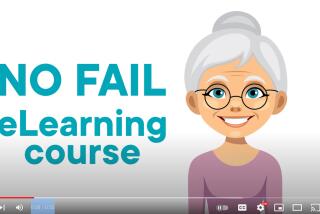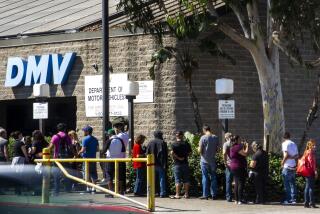It Was a Good Deed Never Forgiven
- Share via
The two women were like mother and daughter.
For 35 years, Rosemary Pool Engle and Elizabeth Kovach had seen each other through divorces, weddings and retirement. So it was agonizing for Engle to report her 83-year-old friend to the Department of Motor Vehicles as an unsafe driver.
One small comfort was that Kovach would never know who turned her in. Engle was assured her report would remain confidential.
Instead, the DMV sent Kovach a copy of the complaint, complete with the name of her accuser. They took away her license, but also ended a long and deep friendship.
Weeks later, when Kovach was in a hospital bed dying of congestive heart failure, unable to speak, she would pull back from her friend’s arms.
“She hated me,” Engle said.
“In the end I betrayed her,” Engle said. “If I had to do it over again, I guess I’d let her drive. Horrible, because I went to the professionals for advice and this is what the professionals did.”
A broken-hearted Engle sued the DMV in February 1998, saying the agency violated the law that guaranteed her confidentiality. Four months ago, she settled for $125,000, receiving $31,000 after expenses and attorney fees. The case forced the DMV to change its procedures to ensure names are kept secret.
State officials describe the Engle case as a mistake, and say it is the only one the agency knows of in which a tipster’s confidentiality was violated.
“You can have any of a myriad number of rules in place, but as long as humans were involved, there can be errors,” said Nathan Barankin, a spokesman for the state attorney general’s office, which represented the DMV in the lawsuit.
Californians were reminded last month how high the stakes can be after an 86-year-old man sped through the Santa Monica Farmers’ Market and killed 10 people.
Since that accident, agency employees have seen an increase in the number of phone calls from people about reporting family members’ poor driving, said DMV spokesman Armando Botello. In 2002, the agency received 86,000 bad-driver referrals from law enforcement officers, doctors and family members, resulting in the revocation of 42,000 licenses.
Ken Katz, associate state coordinator for AARP in Orange County, said confidentiality is an important issue to people worried about friends and relatives. “People ask me: Do they tell the person being called in who reported them?” he said.
Until recently, the DMV made little effort to guard the confidentiality of bad-driver complaints, which was guaranteed by a law passed more than 20 years before the Engle case. In response to Engle’s lawsuit, the DMV instituted procedures so that information to be kept secret was put in an envelope marked “confidential,” agency director Steve Gourley said.
Last year, the agency created a form designed for bad-driver complaints that includes a box that can be checked to make the report confidential.
But Richard Vilkin, Engle’s attorney, is skeptical that the agency has tried hard to protect the confidentiality of bad-driver complaints. He said that in 2001, he asked the DMV for documents showing safeguards the agency had implemented, and got little in return.
“They produced nothing that would show they had added a procedure for treating confidential information in any special way,” he said. “My impression through their conduct of this case was that they never took the issue seriously.”
Engle and Kovach, who both lived in the San Fernando Valley, met in the early 1960s at a landscaping class at Pierce College in Woodland Hills. Kovach, about 20 years older than Engle, had been married and divorced. She worked as an adjudicator for the state Department of Human Resources. She had no children; her only family was a brother in Cleveland, from whom she was estranged.
Engle had her own family problems, including a fractious relationship with her mother, who refused contact with her.
Kovach, known as Elsie, quickly entered the fold of the Engle family -- Rosemary, her husband and three daughters. Christmas, Thanksgiving, birthdays and camping trips, Kovach was there.
“She probably spent more time with us than a grandmother or an aunt would,” said Jennifer Pool, 38, Engle’s daughter.
When Engle’s husband, an engineer, was transferred to Orange County in 1972, the family moved to Costa Mesa. The marriage broke up, and Kovach was so distressed by her friends’ split that she sought counseling herself.
Engle got a job traveling, selling art supplies. Her work took her to Central California, and three times a week she would stay overnight at Kovach’s house in the Valley. The relationship was so close that Kovach made the younger woman her trustee for financial and medical affairs.
In late 1989, Kovach retired and moved to Vista, in San Diego County. As the years passed, Kovach’s health -- and her driving skills -- deteriorated. She took a fall, and her back was never the same. She had heart disease and suffered from depression. After a knee replacement didn’t go well, she had to use a cane or walker.
On Engle’s frequent visits, she was approached by Kovach’s neighbors, who urged her to persuade her friend to quit driving. She drove too fast along the streets of their retirement community, they complained. Slumped in the driver’s seat of her Plymouth, the 5-foot-2 woman could barely see the street.
Engle knew they were right. Once, on a trip to the movies, Kovach made a left turn into oncoming cars, Engle recalled. “And she crawled across the street. I said, ‘Hurry up, hurry up, Els, there’s cars coming around the curve.’ She said, ‘Don’t worry. They’ll see us.’
“That was the last time I drove with her,” Engle said.
Engle hoped that when her friend’s license came up for renewal on her 83rd birthday in 1997, she would have to take a driving test. But Kovach was given only the written exam, which she passed.
Engle agonized about what to do. “Living alone, that car was everything to her,” she said.
Jennifer Pool remembers her mother’s quandary. “She was really apprehensive, not wanting to do that to her good friend,” she said. “But it was a dangerous situation to have Elsie behind the wheel. My mom knew she had no choice at that point. She was very concerned Elsie was going to hurt somebody.”
In February 1997, Engle walked into the DMV office in Laguna Hills and asked a clerk what she could do.
The clerk handed her a multipurpose form. Nervous, “I scrawled things on it ... never thinking the world would see that piece of paper,” Engle said in an interview last week. “I’m saying over and over, ‘You will make this anonymous or confidential?’ I knew Elsie
She wrote Kovach’s name, address and phone number on the form. She also wrote 65 words beginning, “I would like you to re-evaluate Elizabeth’s ability to drive.”
At the end she wrote, “ANONYMOUS -- ANONYMOUS. Please I want this to be ANONYMOUS.”
She tried to disguise her signature. Underneath it, the clerk wrote, “signature of Rosemary Engle.”
In a deposition, Reuben Beauchamp, office manager of the DMV’s driver safety branch in Irvine, was asked by Engle’s attorney: “The DMV does not have any written policies or procedures as to who is supposed to ensure that [the confidential material] does not get sent to the licensee; is that correct?”
Beauchamp answered: “That’s my understanding.”
A couple of months later, Kovach told Engle that the DMV was questioning her driving ability, and she was angry. In the early fall, Kovach lost her license -- although she did not stop driving.
In October, Engle visited Kovach. They went out for ribs, Engle recalled, and after dinner, her friend turned to her and said without warning, “Why did you turn me in to the DMV? Do you know what this has caused me, mentally, physically and financially?”
Engle was stunned. How could she know? Back at Kovach’s house, the older woman threw an envelope toward Engle, who opened it and saw a copy of the form she had completed at the DMV.
“Els,” she said, “why don’t you do this gracefully,” and walked out the door.
She returned the next weekend to plant a six-foot braided ficus she had promised Kovach. The older woman sat on a bench and watched, saying nothing. “It was worse than anger,” Engle said. “An iciness. Very controlled. She was distancing herself from me.”
Four or five days later, a neighbor of Kovach’s called Engle at 6 a.m. as she was heading out of town. An ambulance had taken Kovach to the hospital.
Engle and her daughter, Kim Pool, then 36, went to the hospital. Kovach let Pool massage her head, but she pulled away from Engle. Several days later she fell into a coma and died.
Engle believes it was her betrayal that killed her friend.
“I owe Elsie a lot,” Engle said, “in friendship and emotions. She went through a heck of a lot with my family and myself, and at the end I had turned on her.”
More to Read
Sign up for Essential California
The most important California stories and recommendations in your inbox every morning.
You may occasionally receive promotional content from the Los Angeles Times.











